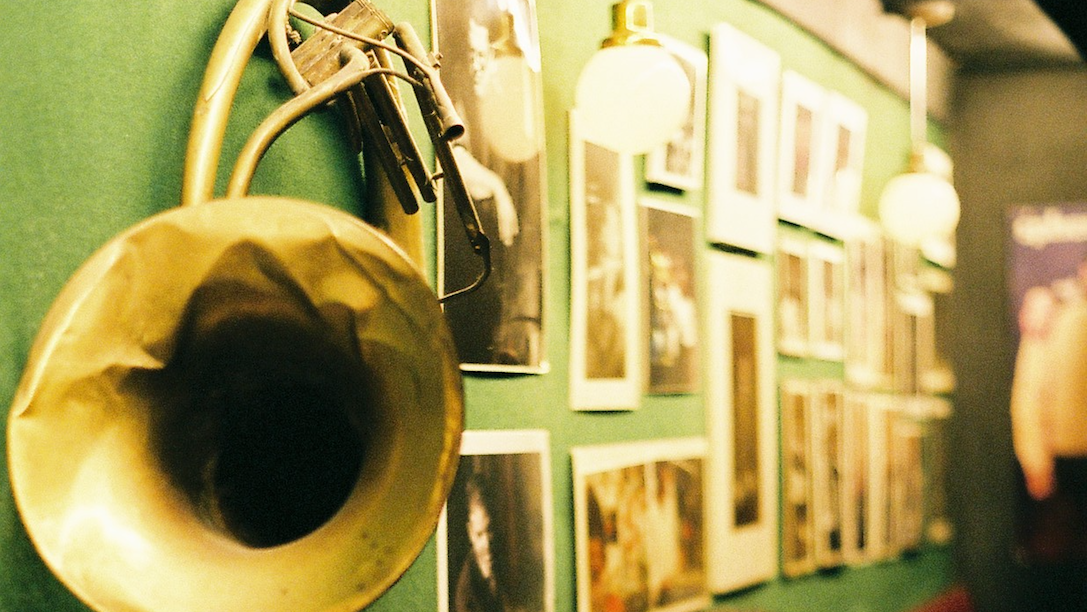I don’t remember who I heard play the first time I went to the Village Vanguard, but I know it was not the first time I had heard the sound of the room. The Vanguard is probably the oldest continuously running venue for jazz music in America. I knew what it sounded like to be in there because nearly every major figure in the history of modern jazz has released an album titled “Live at the Village Vanguard,” or some variation thereof. I had been listening to many of these records, by Sonny Rollins, Kenny Burrell, Bill Evans, John Coltrane, Dexter Gordon, and others before I ever had a chance to go there myself. My first visit felt like a return.
The club stands on 7th Avenue in New York City, under a long red awning, between a pizza parlor and a nail salon. To enter, you descend an inhospitably steep flight of stairs and pass through a narrow door. Inside, you find an interior that seems frozen in time. Somehow, in spite of being in good working condition, the room seems not to have changed since approximately the mid-1960s—when the most famous Live at the Village Vanguard records were recorded. Its dark green walls are covered with photos of jazz musicians, only a small handful of which seem to have been taken in the past two or three decades, and all of whom, it’s safe to assume, have appeared on its stage. To go to the men’s room, you have to walk through the kitchen, where you are likely to see the musicians waiting to go on, killing time among crates of soda cans. I’m not sure where the women’s room is. The drinks menu seems blissfully unaware of today’s craft cocktail trends, though it has been updated this year with the addition of a Boulevardier, a Negroni made with whiskey instead of gin.
The Vanguard opened in 1935 as something like a beatnik cafe, run by proprietor Max Gordon. In 1949, he married Lorraine Gordon, the ex-wife of Alfred Lion, founder of the jazz label Blue Note. Lorraine had already secured her place in the history of American music by discovering Thelonious Monk. In the mid ’40s, she convinced her then-husband to record the eccentric pianist and composer, in a series of sessions that comprised some of the foundational masterpieces of modern jazz. It is most likely due to her influence that the Village Vanguard went on to attain its singular reputation as the most iconic jazz club in the world, an expression of her intimate knowledge of the music and her discerning taste. It seems unlikely that there has ever been a bad performance at the Village Vanguard. Gordon continued to run the venue until her death of a stroke in early June.
Many of the nights I attended the Vanguard over the years, Gordon was also in the crowd. She had a reserved seat near the men’s room, and could sometimes be heard exasperatedly telling women they were going the wrong way. I wouldn’t have known her from any other cantankerous concertgoer if not for a performance by the pianist Barry Harris, who was playing with his trio of many decades, bassist Ray Drummond and drummer Leroy Williams. Harris has been around—he’s one of a very small number of living people to have played with Charlie Parker, more or less the inventor of modern jazz. A couple years shy of 90, Harris is in the phase of life commonly characterized as not giving a fuck. He is such a master at his chosen idiom, bebop, that he doesn’t have to.
The night I saw him, the club had taken the unusual measure of giving him a microphone to speak into, as well as the one for his piano. He not only offered commentary on the songs he performed, he sometimes sang the words. At one point, he wanted to play a song he couldn’t remember the chord changes to. Drummond called out the changes to him as he went, and Harris played along without dropping a stitch.
At one point, Harris announced, “We’re going to play a song now for a very special lady, who we’re lucky enough to have here with us tonight.” He proceeded to play a melody I recognized as the Tin Pan Alley standard, “Sweet Lorraine.” I realized that the woman who had been carrying on like she owned the place literally did own the place. Eventually, Harris’s mind wandered and he went into a different song, with Drummond and Williams capably shifting gears to follow.
When her husband died in 1989, Lorraine Gordon closed the club for a day. The next day, she opened it back up again. After her death, too, the Vanguard is still running. In late June, I went there for the first time since she died, to see the trumpeter Tom Harrell. It was still the way she left it. The music, unsurprisingly, was exquisite. I had a Boulevardier.
Shuja Haider






